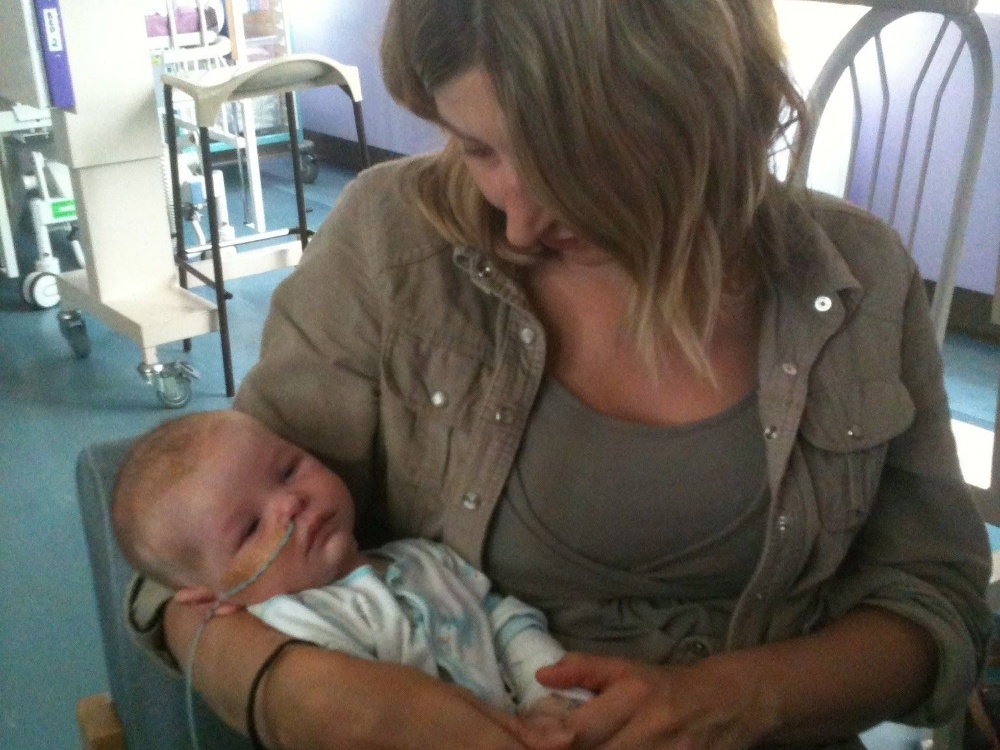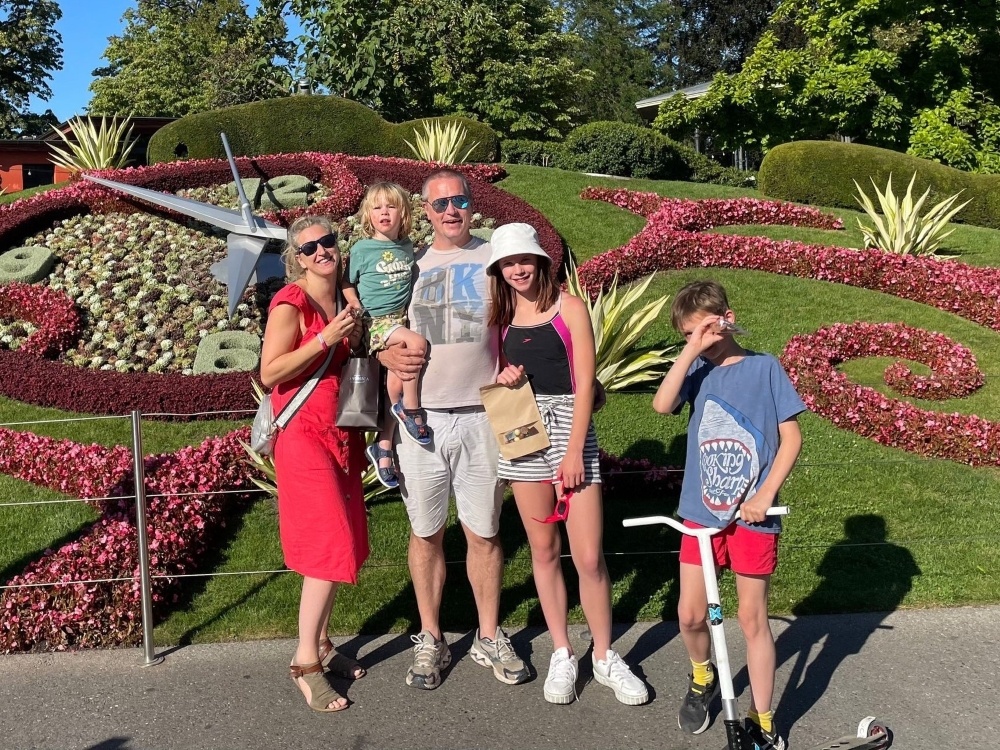Beth and Ollie were so excited when their first child, Casper, was born. He was a healthy baby, but within six weeks he became unresponsive and floppy, and stopped hitting his milestones. From that point on this new family embarked on a nightmare journey that spiralled all too quickly into tragedy – after just 99 days Beth and Ollie found themselves saying goodbye to their son, who died of mitochondrial disease.
“He was our first born, and we went from everything being wonderful to everything being ripped from us,” recalls Beth. “We lost our child, we lost being parents, and we lost any hope at that point of having children again. Our grief was for all three of those things.”
Understandably, Beth withdrew from society, barely leaving the house, and found it incredibly difficult to be around other families or children. “To begin with my grief was all about me, it was very selfish,” she explains. “And that grief will always be there, I just manage it differently now. In the early days I’d have done anything for Casper to still be here, to hold him one more time. But as time went on, I started to feel selfish for wanting that.”
A few months after losing their son, the couple packed all their belongings into storage and set off to France on a cycling trip. Even as they travelled, they were looking for anyone to talk to who understood a little bit about what they were going through. But they were overwhelmed by how few people had heard of mitochondrial disease.
A desperate search for support
When Beth googled it, although The Lily Foundation was still in its early stages, the charity’s website was one of the few that came up. “I was desperate for emotional support. I sent Liz a message and we had a few chats. And they're just wonderful people – everybody we've met. They’ve got a good team and them being there means the world to us.”
Although she values the support she’s had from the charity, Beth still finds the occasions when she’s involved with the Lily team affect her profoundly, as do the anniversaries and birthdays. “It’s always so hard to talk about Casper in a positive way because we didn’t have much time with him,” she explains, “and the happy times we did have were completely overshadowed in the end.”
Beth admits there are even times when she avoids mentioning Casper, like when people ask her how many children she’s got, because it’s like opening a can of worms. “Every year I feel different about it – I do feel blessed that I got through it, and I’ve got to a point where I’ve come to terms with what happened to him. Casper’s still part of my life, but I’m so thankful I’ve been able to go on and have my own biological children.”
Because today Beth is proud mum to three beautiful children, Amy, Felix and Hugo. But her journey to this happy family unit hasn’t been easy, and she still struggles to balance the life she has now with the one that could have been. “Every time I think of Casper, I wonder what I’m missing. Am I wishing he was here but still living with mitochondrial disease, or am I wishing he was here and didn’t have the condition? Part of me wishes we’d never heard of mitochondrial disease. But then I’m not doing justice to my other children by wishing that. Because I want my other children here, which would never have happened otherwise.”
A mitochondrial disease diagnosis
Getting the mitochondrial disease diagnosis helped bring closure for Beth and Ollie, and helped them make informed decisions about family planning, and Beth’s grateful for that. “Without the science we’d probably never have had a diagnosis for Casper, and we might never have had our other kids. That knowledge helps hugely. Without answers, I don’t know what decision we might have made. Would we have taken the risk? I don’t know.”
The couple travelled to Newcastle to meet mitochondrial specialists Prof Robert McFarland and Prof Sir Doug Turnbull and undergo gene testing. “They were fantastic. They talked us through our test results and made something very scientific really simple to understand. Most importantly, they gave us hope that if we were to have another baby, we could effectively test and make a decision with a good degree of certainty.”
And when they did decide to take the plunge and have Amy, they ended up making history by being the first family to go through PGT (Pre-Implantation Genetic Testing), a type of IVF that enables an embryo to be tested for a specific gene mutation. “After Amy, Felix was conceived naturally,” continues Beth, “but with a CVS prenatal test. We know he carries a low level of mutation.”
The couple went on to conceive again, but tragically that baby was 100% mitochondrial deficient so they made the agonising decision to terminate. “I couldn’t bring another baby into the world who was going to die. But then after a bit of a gap we had Hugo in 2019,” she says proudly. “That’s definitely it now!”
They’re very open with their children about what happened to Casper, and want them to grow up understanding the disease rather than living in fear of it. “They ask a lot of questions, especially as they get older, but when we go to the Lily support weekends they engage with other kids and love talking about their brother, even though they never knew him.”
Reflecting on what could have been
Beth is pretty pragmatic about the cards fate has dealt her. “One little thing happened all those years ago, that tiny mitochondrial mutation,” she reflects. “If a different egg had been chosen, I could’ve been leading a different life right now. I re-evaluated my life after Casper, and now I dedicate my time to my new family. At the same time, there’s this aching loss because he isn’t with us. I think about what the journey could’ve been, if he could’ve still been here.”
The experience of losing a child has definitely changed Beth’s outlook. “I want my children to get the best out of life, and I’m not talking about physical toys or monetary things. It’s important to hold on to every moment of enjoyment and realise how precious life is.”
Beth’s keen to raise awareness about mitochondrial disease and has taken part in several Lily fundraising events. “I don’t want sympathy,” she says firmly, “but I want people to be aware of how vicious mitochondrial disease is, and how things need to be done to improve the lives of those affected. I didn’t want this to happen to me, but it did, and it’s forced me to change. I’ve experienced a different life, not the one I chose, but I’ve tried to make the most of something tragic. Sometimes it takes a huge event to make us appreciate the life we have, doesn’t it?”
We couldn’t agree more. Life is precious, but those no longer with us are also precious. So please spare a thought for those much-loved and missed babies, and all the mums and dads like Beth and Ollie remembering them – let them know they’re not alone.
This article was first published in October 2023.


